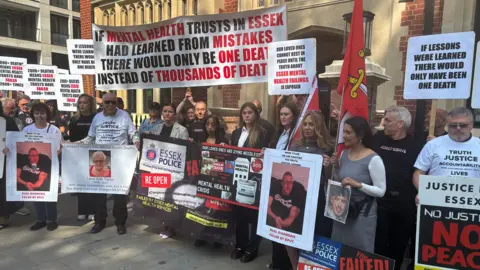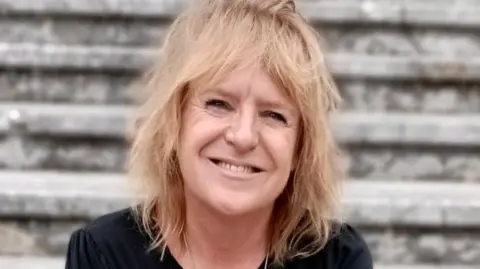People still dying avoidable deaths, inquiry told
 PA Media
PA MediaRepeated failures in mental health care have seen "avoidable deaths" continue in places people should be safe, an inquiry has heard.
The Lampard Inquiry is analysing the deaths of more than 2,000 patients under NHS care in Essex between 2000 and 2023.
Deborah Coles, director of the charity INQUEST, said lessons were not being learned from deaths and were instead left to "disappear into the ether".
Essex Partnership University NHS Foundation Trust (EPUT) has apologised to those affected.
The public inquiry is England's first into mental health deaths, with evidence being heard in London after sessions in September and November.
Ms Coles accused health trusts across the country of failing in their duty of care to patients.
"People who go into detention are completely dependent on others for their treatment and care, and that's an extremely vulnerable position to be in," she said.
She told the inquiry there was an "overuse in restraint" at mental health settings, as well as segregation and seclusion - particularly towards black people.
Ms Coles said lengthy investigations into deaths had left families unable to grieve, pushing them into "a very isolating and lonely place".
 INQUEST
INQUEST"Nothing can bring your loved one back, but they hope by going through these protracted, distressing processes, something positive can come out," she continued.
"That can give meaning to people's loss - that can be quite cathartic and healing - but only if they see the corresponding change happen."
But that change, the inquiry was told, would often not occur.
Instead, families were being assured lessons would be learned, only to then hear of another death in similar circumstances, Ms Coles said.
"It's the thing that makes me the most angry, frustrated and upset, that we're still seeing those familiar issues," she added.
Many NHS trusts were more concerned about their reputation than about seeking improvements, the charity director continued.
She said it was often left to bereaved families to "drive culture and policy change".
"We've got to acknowledge that people are still dying avoidable deaths in places where they should be safe," Ms Coles added.
EPUT chief executive Paul Scott has apologised for deaths under his trust's care.
He said: "As the inquiry progresses, there will be many accounts of people who were much loved and missed over the past 24 years and I want to say how sorry I am for their loss."
You can find organisations offering mental health support and advice through the BBC Action Line
Follow Essex news on BBC Sounds, Facebook, Instagram and X.
